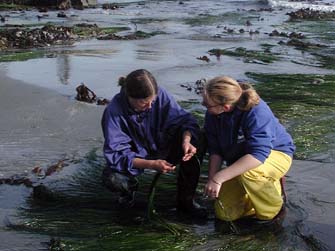June – August, 2024
OIMB offers a variety of courses during the summer term. In addition to the eight week term, four week and two week courses and weekend workshops are available as well. Courses are open to qualified students from all institutions as well as those interested in continuing education. Normally, courses meet for at least seven hours a day and are designed for upper-division biology majors, environmental studies/science majors, and graduate students in these disciplines. The recommended course load for the eight-week session is 14 to 16 credits. All students registering for OIMB courses should fill out an application of admission (see application form link on the right) and, if needed, request room and board by email at oimb@uoregon.edu.
If you are a non-UO student, you will need to request a Personal Access Code (PAC) here to be able to register for classes.
BI 211, 212, and 213 (or equivalent) are prerequisites for the 8 week courses. Weekend workshops do not have prerequisites.
8 Week Courses (June 24 – August 16)
BI 451/551 INVERTEBRATE ZOOLOGY (8 quarter hour credits)
An introduction to the diversity of marine invertebrates e.g. all multicellular marine animals, except the vertebrates. What they look like (body plans & structure), how they work (functional morphology), where they live, their natural history and behavior (general ecology). Lectures will introduce organisms, explain their form & function, and include current views of evolutionary origins and phylogenetic relationships. Field trips will explore animals in their habitats and labs will allow careful study of living invertebrates, emphasizing form and function. Fulfills Area 2 major requirement. Meets 8:00 a.m. – 5:00 p.m. Monday, Wednesday and Friday, with early release at 3:30pm for Wednesday seminar. Instructor: Patrick Baker
Check out this video about the Summer Invertebrate Zoology course at OIMB! PDF version
See what students say about this course
BI 455/555 MARINE BIRDS AND MAMMALS (6 quarter credits)
The Oregon coast has a diverse marine bird and mammal fauna and this course takes advantage of many opportunities to study the biology of the seabirds, seals, sea lions, and cetaceans of the region. Topics covered include systematics, ecology, social systems, morphology, evolution, and physiology. Extensive field trips including boat cruises offer opportunity to study the animals in their natural environment. Laboratory sessions use museum preparations and dissections of fresh specimens to study anatomical and physiological features. Students undertake group projects on nesting seabirds, and give presentations about marine birds and mammals. Meets 8:00 a.m. – 5:00 p.m. Tuesday and Thursday. Instructor: Doug Warrick
Binocular information.
See what students say about this course
BI 457/557 BIOLOGY OF FISHES (6 quarter credits)
This course includes biology, physiology and ecology of tidepool, estuarine and marine fishes, and emphasizes data collection and analysis through a study of Oregon’s fauna. Meets 8:00am – 5:00pm Tuesday and Thursday Instructor: TBA
4 Week Courses
June 24 – July 19
BI 457/557 DEEP-SEA BIOLOGY (5 quarter credits)
This course is an overview of the organisms, habitats and ecological processes occurring in deep-water systems on the continental shelf and slope, submarine canyons, seamounts, abyssal plains, methane seeps, hydrothermal vents and hadal trenches. Laboratory activities and field trips will strongly supplement lecture material and assigned reading; field work and projects will involve the collection and analysis of offshore trawl, dredge, core, ROV and camera sled data. Meets 8:00 a.m. – 5:00 p.m. Monday, Wednesday and Friday for the first four weeks of summer term, June 26-July 21. Instructor: Craig Young
2 Week Courses
Course meet for two consecutive weeks.
August 19 – 23 and Aug. 26 – 30
BI 399 INTRODUCTION TO EXPERIMENTAL DESIGN AND STATISTICS (4 quarter credits)
A course designed for upper-division undergraduates and graduate students that explores the principles of experimental design. The course draws heavily from professional literature discussing appropriate use of statistics in experimental studies including modeling of simple and more complex experiments and evaluation of appropriate analysis techniques. Lectures, practicals, and readings emphasize application of univariate designs in ecological studies. Meets 8:00 a.m. – 5:00 p.m. Monday-Friday both weeks. Instructor: Brian Bingham
See what students say about this course
September 5-19
OMBI 488: BI Tropical Marine Biology in Panama (6 quarter hour credits)
An intensive field course in Panama focused on tropical coastal biology and environmental issues. The course will integrate biology of 3 distinctive coastal habitats (coral reefs, mangroves, and seagrass meadows) and consider relevant human environmental issues on global and local scales. The course will be offered in Panama at the Smithsonian Tropical Research Institute’s (STRI’s) Bocas Research Station (BRS). In spring term 2024, students are required to take BI 405 Reading/Seminar. The spring seminar course will require students to read primary and secondary literature that explores the habitats and environmental issues that will be seen in Panama. In summer 2024 students will work to design and plan their research project to carry out during the field course in Panama. Instructors: Richard Emlet and Maya Watts . Prerequisite: BI 451 Invertebrate Zoology.
Weekend Workshops
Courses meet all day Saturday and Sunday for two consecutive weekends
June 29-30 and July 6-7
BI 408/508 BIOLOGICAL ILLUSTRATION (2 quarter credits)
Shows how to produce accurate drawings of animals and plants suitable for reference, publication, or display. No prior experience is necessary. Techniques include pen and ink, pencil, scratch, and coquille board (sample illustrations). Meets 8:00 a.m. -5:00 p.m., Saturday and Sunday. Instructor: Nora Sherwood
Biological Illustration supply list.
July 27-28 and August 3-4
BI 408/508 SEX IN THE SEA (2 quarter hour credits)
Dive into the weird and wonderful ways marine animals ensure successful reproduction in the ocean! We will cover common modes of reproduction, from copulation to sexual confetti, while also investigating some of the oddities, such as sibling cannibalism and larval cloning. We will discuss the biological and environmental drivers behind each reproductive mode and how or why an animal might change its reproductive patterns. Meets 8:00a.m.-5:00p.m., Saturday and Sunday. Instructor: Caitlin Plowman
Questions: Email oimb@uoregon.edu

